Podcast: Play in new window | Download
Subscribe: iTunes | Android | RSS
All sound recorded and produced by Dominick Boyle, or available in public domain.
Podcast: Play in new window | Download
Subscribe: iTunes | Android | RSS
All sound recorded and produced by Dominick Boyle, or available in public domain.
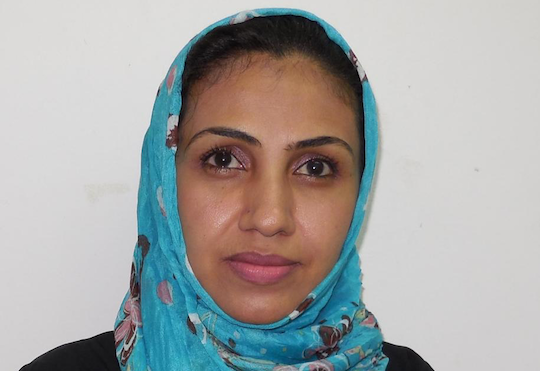
In her stories, Al-Attas documents Arab women’s lives in general and Yemeni women’s lives in particular.
This essay is the first of a series of three which will highlight three women writers from Yemen, Sudan, and Saudi Arabia who never before have been translated into English. The series was catalyzed by Asymptote’s call this past winter for a Special Feature for the Spring Issue dedicated to literature from the countries covered by Trump’s travel ban on certain predominantly Muslim countries. One of Asymptote’s core goals is to provide a platform for work from regions generally underrepresented in translation. Yemen, Sudan, and Saudi Arabia have long been marginalized in the realm of translations from Arabic to English. The contributors have chosen to focus on women writers because they tend to face greater hardships in getting published, particularly in Saudi Arabia.
Yemeni writer and journalist Huda al-Attas, born in 1971, is a pioneer of women’s short-story writing in Yemen and other Arab countries. Al-Attas has been writing for more than two decades. She was born in Hudarmut, in southern Yemen, and was raised in Aden with her brothers by her mother. Her family members are her biggest fans and greatest supporters. As a journalist, she is a regular Yemeni newspaper columnist. Her short stories have been published in Yemen and all over the Arab world.
Al-Attas has a broad fan base, consisting of not only conservative middle-aged literary readers but also a new generation of young, liberal readers. Contrary to stereotypes about the Arab world, Yemeni culture has been hospitable to writers, male and female alike. Interestingly, Al-Attas’s Yemeni audience can be divided into two parts: a liberal, secular audience that desires progressive change and a conservative audience that does not believe in women’s rights and even goes so far as to believe that a woman could not be the author of such daring work.
Well regarded by writers around the Arab world, Al-Attas is known as a liberal advocate of human rights and equality between people. She was well known before the Arab Spring as a bold writer who shed light on religious, social, sexual, and political taboos in a conservative society that shackles both men’s and women’s rights and prevent progress. Her personal bearing is as daring as her literary work: for example, pictures of her not wearing a scarf (a breaking of taboo in her culture) appear frequently in newspapers. She has received awards from many different Arab countries, such as Yemen and UAE. Her collections of short stories include Obsessed Spirit…Obsessed Body (hājisrūḥwahājisjasad, 1995), Because She (li’annaha, 2001), and Lightning Training to Be Light (bariqyatadarrabalada’, 2003). Her work has been translated into many languages. Topics that she addresses include incest, patriarchal ownership of women’s bodies, child brides, child begging, child labor, and khat addiction, to name a few. She explores these topics through innovative literary techniques that are as liberating as her subject matter.
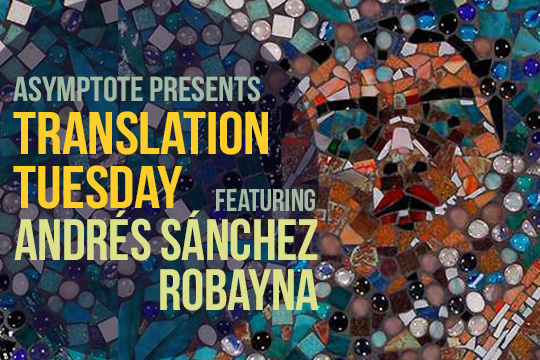
far away, the shapeless clouds slide off at their leisure
Andrés Sánchez Robayna’s poems are a treat — in delicately constructed verses, they evoke deeply visual associations. The lines are startling in their clarity, and yet succeed in wrapping the reader in their complex ambiguities.
The Sleeper Who Heard the Most Diffuse Music
The delicate backstrokes of sleep
rise red over the ocean,
thick, warm clouds
on the far side of the vaulted day,
the sea in this summer breeze.
The most diffuse music, in a dream,
the most intense vision, he dreams
the ebbing waves, the sun, the pines
twirling amidst these swells and drafts.
His back dissolves into clouds.
Neither the sun nor the dawn will be for him
the illusion of sun or dawn or blue.
On a Swimmer’s Shadow
not in living rock: out of granite
sculpted angles of the pool
the shadow on the mosaic below
sketches the figure above
far away, the shapeless clouds
slide off at their leisure
in the blind light of the edges
labile light, still shadow
so his written body flees
sculpted thus, the light dives deep
Translations from the Spanish by Arthur Dixon & Daniel Simon
Editorial note: From Al cúmulo de octubre: antología poética, 1970–2015 (Madrid: Visor Libros, 2015). Translated by permission of the author.
A prolific author, editor, critic, and translator, Andrés Sánchez Robayna has published more than sixty books of poetry, essays, and translations. He completed a PhD in philology at the University of Barcelona in 1977, directed the magazines Literradura and Syntaxis, and is currently professor of Spanish literature at the University of La Laguna.
Arthur Dixon works as a translator and as managing editor of World Literature Today’s affiliated journal Latin American Literature Today. His translation of Andrés Felipe Solano’s The Nameless Saints (World Literature Today, September 2014) was nominated for a 2014 Pushcart Prize. His most recent project is a book-length translation of Arturo Gutiérrez Plaza’s Cuidados intensivos (World Literature Today, September 2016). He is Asymptote’s Spanish Social Media Manager.
Daniel Simon is a poet, translator, and the editor in chief of World Literature Today. His latest verse collection, After Reading Everything, has been nominated for the Forward Prize, the T. S. Eliot Prize, a Pushcart, and several other awards. His translation credits include Ramón Gaya, Eduardo Mitre, Mario Arteca, José Mateos, Abdellah Taïa, and Boualem Sansal.
*****
Read more translations:

Jessie Stoolman on the first book ever to be translated to English from Wolof, an indigenous language of Senegal.
Doomi Golo is the first book to be translated into English from Wolof, an indigenous language widely spoken in Senegal. In its interesting linguistic journey, the Francophone author Boubacar Boris Diop has also personally translated the novel from Wolof to French.
The protagonist Nguirane Faye’s six notebooks written for his grandson compose the heft of the novel. One of the many iconic passages in the book tackles a central question facing the decolonizing world:
I am perfectly aware, Badou, that turning one’s back on the outside world is tantamount to the kiss of death. It’s bound to be a good thing if a nation lets the winds that are blowing from all corners of the globe expand its chest, but not unless we do what we can to preserve the crucible destined to receive its breath when they are blowing. Life, after all, is not born out of the void.
Every aspect of Diop’s masterpiece, from its content to choice of language to its translation, addresses this struggle to preserve marginalized identities in a globalized context. It is unsurprising that this pioneering novel was a finalist for the Best Translated Book Award 2017, founded by Three Percent.
Interestingly, Diop decided to translate Doomi Golo from Wolof after being “inundated with requests,” according to Vera Wülfing-Leckie, one of the two translators of the English version. Adding intrigue to the situation, Wülfing-Leckie notes in her captivating introduction that some scholars argue that the French version, entitled Les petits de la guenon, “was a new novel that merely bore close similarities to the original.“ As for the English translation, Wülfing-Leckie mainly worked with the French version. However, El Hadji Moustapha Diop, Boubacar Boris Diop’s son and the second person in the translating duo, consulted the Wolof version as well.

A trip around the literary world, from USA to Latin America to the Czech Republic.
The weekend is upon us—here’s a detailed look at the week that was by our editors-at-large. In the United States, Madeline Jones reports directly from the trenches of the Book Expo in New York City. A gathering of publishers, booksellers, agents, librarians, and authors, the event is the largest of its kind in North America. We also have Sarah Moses filling us in with tidings from Colombia and Argentina, and updates on the Bogotá39, a group of thirty-nine Latin American writers considered to be the finest of their generation. Finally, Julia Sherwood brings us some hot off the press literary news from the Czech Republic. Settle in and get reading.
Madeline Jones, Editor-at-Large, reports from the United States:
Last week in New York City, Book Expo (formerly Book Expo America) set up shop at the famously-disliked Javits Center on western edge of Midtown Manhattan. Publishers, literary agencies, scouts, booksellers, and readers gathered for discussions about the future of publishing, meetings about foreign rights deals, publicity and media “speed-dating” sessions, and more. Authors and editors spoke about their latest books for audiences of industry insiders, and lines trailed from various publisher booths for galley signings.
Though the floor was noticeably quieter than previous years, and certainly nothing compared to the busy hub of foreign rights negotiations that the London and Frankfurt book fairs are, Asymptote readers will be pleased to hear that multiple panel discussions and presentations were dedicated to foreign publishers, the viability of selling translations in the U.S., and indie books (which more often tend to be translations than major trade publishers’ books). READ MORE…

Awards, publications, and readings—our team members have been keeping busy!
Writers on Writers Section Editor Ah-reum Han’s fiction, The Blind Bride, published in Okey-Panky, was recognized in The Wigleaf Top 50 (Very) Short Fictions of 2017.
Assistant Blog Editor Aurvi Sharma was interviewed by Wasafiri. She was also awarded a Bread Loaf-Rona Jaffe Foundation Scholarship and her essay, Hymns for the Drowning appeared in Pleiades Magazine.
Criticism Editor Ellen Jones published a review of Juan Carlos Márquez’s novel Tangram, translated by James Womack, in the Glasgow Review of Books.
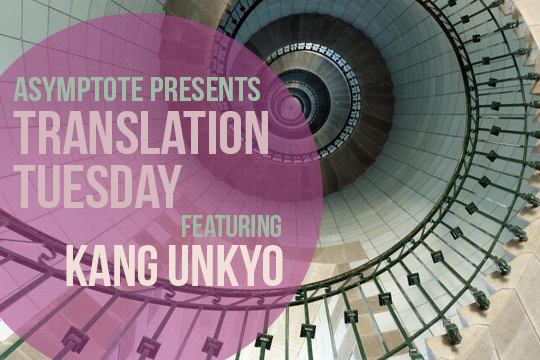
"the sunset which used to come running, when she smiled carefully"
Kang Unkyo is a veteran Korean poet whose poetry, like all great art, has evolved in response to the times. From nihilistic political verse to “People’s Poetry” of abstractions, she has refreshed many traditional forms. Known for her lyrical touch, the poet here creates a sensory pastiche of the woman in Tula.
That woman in Tula who used to blush,
that woman in Tula who used to ask the menu carefully,
that woman who used to put on a red-apple-patterned apron
and make red salad,
the sunset which used to come running, when she smiled carefully,
the woman in Tula who used to turn over and wipe the reddened tables,
that woman, red glasses, red curtains, red calculator

"We read translated literature to access a common humanity that transcends borders."
Carol Apollonio translated the first Dagestani novel available in English, The Mountain and the Wall by Alisa Ganieva. Anglophone readers will find much to relate to in the novel’s premise—a rumor that the Russian government is building a wall between the Muslim provinces of the Caucasus and the rest of Russia. In this free-wheeling, clear-eyed interview with Hannah Weber, Apollonio takes an impassioned look at literatures in translation, and at the simplest yet most complex human propensity—the desire to read.
Hannah Weber (HW): You’re a scholar of Russian literature and translate works from both Russian and Japanese. What led to your interest in these particular languages?
Carol Apollonio (CA): Most of your life path is luck. I knew early on that learning languages came easy to me, so I kept on doing it. After French, it was quite a shock to realize that for Russian you didn’t just plug the words into grammar you already knew. You had to change everything around in your brain. Plus, all the words were different. Anyway, if you’re rebellious enough, you decide it’s worth putting in the effort. It helped that I’d studied some Latin early on.
So, why Russian? Here’s how a Cold War eighteen-year-old radical hippie thinks in 1973: “The Russians are our enemies; the only problem is that Americans don’t know Russian. I’ll learn Russian, become president of the USA, we’ll all learn to love one another, and that will solve the whole problem.” So, I went to college and studied Russian and politics. As it turned out, I was too impatient and tactless for politics. As for Russian, at that time basically there were three paths for Russian-language students: one, learn about the complicated grammar and crazy vocabulary—recoil, and turn to economics or psychology; two, learn the language, recoil from the politics, and go into national security; three, learn the language, love it, read the literature and have your head explode. I’m one of the survivors with the exploded heads. READ MORE…

If you're wondering what's happening in the world of literature, you've come to the right place
This week brings us the latest, most exciting news from Austria, Taiwan and the United States. Contributor Flora Brandl gives us a taste of what Austria’s literary festivals have in store for us; Editor-at-Large Vivian Szu-Chin Chih shares the wonderful news about same-sex marriage in Taiwan and its connection with literature; Educational Arm Assistant Reverie Powell serves up some fantastic and diverse performances taking place in the United States.
Contributor Flora Brandl reporting from Austria:
In Salzburg, the city’s annual literature festival took place this May. Among its most renowned guests were the actor Bruno Ganz, who read excerpts from the deceased Swiss author Robert Walser, and the Salzburg-based, Georg Büchner Preis-winning author Walter Kappacher, who read some of his own unpublished fragments. Other authors featured in the five-day festival were Kirsten Fuchs, Nico Bleutge and Franz Schuh.
In Vienna, the multicultural and interdisciplinary art festival Wiener Festwochen is currently showcasing a number of performances, theatre productions, installations and exhibitions. With this year’s overarching theme of diversity, most works dedicate themselves to pertinent contemporary issues such as postcolonialism and global conflict. The play Während ich wartete (‘While I Was Waiting’, performed in Arabic with English subtitles), by the Syrian director Omar Abusaada and dramatist Mohammad Al Attar, portrays the story of a family as it comes to reflect larger military, political, cultural and generational conflict in Syria. The production has been touring Europe for a year, albeit with a heavily alternating cast: some actors had not yet completed their own asylum processes and were lacking the necessary papers to perform.
The 48-hour performance by Spanish artist Santiago Sierra was also showcased at the Wiener Festwochen. Bearing one of Sierra’s characteristically self-revealing titles, his performance The Names of those Killed in the Syrian Conflict, between 15th of March 2011 and 31st of December 2016 aims to attach individual identities to the many nameless war victims of those images that circulate in our media. Researched by a team of Brazilian academics, Sierra’s reading of names (accompanied by images projected to a wall) toured Tel Aviv, Vienna, London and Buenos Aires. The performance was accessible not only to a number of local spectators, but also to virtual audiences around the globe who were following it online, ensuring that the humanitarian toll taken on the Syrian population is neither overlooked nor forgotten.
Vivian Szu-Chin Chih, Editor-at-Large, reports from Taiwan:
May 24 marked a milestone in Taiwan: the Constitutional Court ruled that the constitution should serve to protect the rights for same-sex marriage. This unprecedented and long-awaited decision has made Taiwan the first Asian country to legalize same-sex marriage. Taiwan’s fight for the legalization of same-sex marriage has lasted for decades and has taken an arduous journey, one which has been reflected through the country’s literature. Last Words from Montmartre, a novel composed by the notable Taiwanese lesbian writer, Chiu Miao-Jin, who took her own life at the age of twenty-six, as well as Pai Hsien-Yung’s fiction depicting the condition of gays in Taipei in the 1960s, Crystal Boys, are again being widely reread and discussed.
From the last Saturday of May until early July, Prof. Li-Chuan Ou of the Department of Chinese Literature in National Taiwan University will be speaking about Chinese Tang poets and classical Chinese poetry at Kishu An. On June 17, the two Taiwanese doctors under forty will give a joint talk on how they have been striking a balance between their vocations and passion towards writing, together with the everyday realities they face in hospital that have been recorded through their writing. Kishu An will also host an exhibition and a series of related talks to pay tribute to the great Chinese writer, publisher, and translator, Ba Jin, starting from mid-June.
From mid-May to July, the winners of 2016 Taiwan Literature Award are touring around the island to share their experiences of writing. The themes of their speeches span from restoring Taiwanese history through historical novels, to aboriginal poetry about the natural landscapes of Taiwan to the world, to silencing and violence in theatre.
Reverie Powell, Educational Arm Assistant, reports from the United States:
Wordspace in conjunction with the South Dallas Cultural Center, presented poet, performer, and librettist, Douglas Kearney on May 25 in the third season of the reading series, African Diaspora: New Dialogues . Much like the Sankofa, a bird that simultaneously looks backward and forward, Kearney embeds the past, present, and future of African Americans into his work exploring themes important to African Americans such as the reality of being threatened and being ‘threatening’ as well as the historical pressure to ‘signify’ one’s identity. Kearney samples hip hop lyrics, rewrites the myth of Stagger Lee, who kills Bill Lyons for stomping on his sometimes magical, sometimes expensive hat, and sentences him to twelve Herakles-like labors.
Additionally, Dallas’s Mark David Noble is “listening to the arts community” with his new podcast, Wordwire, which broadcasts local performances and interviews giving listeners inside peeks at various authors’ creative processes from inception to delivery.
****
Read More News:

When I write of those days now, there is something fuller and heavier
Edil Hassan is a poet of Somali background based in New England. Two of her poems appeared in Asymptote’s most recent issue in the feature on banned countries. Ms. Hassan graciously answered a few questions about her work and inspiration.
Claire Jacobson (CJ): Your poems are so grounded in deep family relationships and stories from the past. Can you talk about the inspiration for these poems? What drove you to write them?
Edil Hassan (EH): The Drought for a long time was only the last stanza. I had seen a picture of a capsized migrant boat in the Mediterranean on some news site—a new picture every week or month, never the same boat. It’s like those videos of Black girls and boys who are killed; I’m waiting to know the person behind the camera. I knew though that this poem was incomplete, and like all stories is layered. Migration comes with a loss of place, and mediating on family helps me track that disappearance.
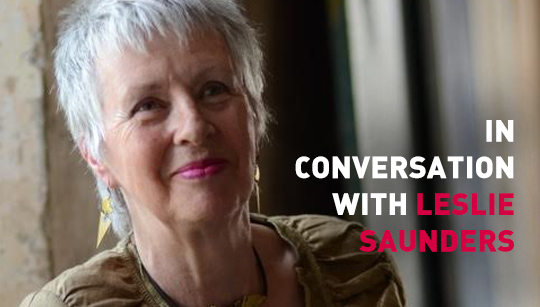
I think there’s a place opening up where poet-translators can have a kind of collective presence
Lesley Saunders has published several books of poetry, and a new collection Nominy Dominy is due out from Two Rivers Press next year. She has won several awards for her poetry, including the inaugural Manchester Poetry Prize, the Stephen Spender Award for poetry in translation and The Poetry Business 2016/17 International Book & Pamphlet Competition; she is currently working on a book of translations of selected poems by the acclaimed Portuguese writer Maria Teresa Horta. Find our more about her work at www.lesleysaunders.org.uk
Theophilus Kwek (TK): Congratulations on winning the 2016 Stephen Spender Prize for Poetry in Translation with your lovely translation of Poema by Maria Teresa Horta! In your commentary, you write about that striking central image of the poem—a ‘prowler-intruder’—which, as compared to Hughes’ ‘thought-fox’, is felt rather than seen. Did you face any challenges in rendering such a tactile ‘muse’ in a different language?
Lesley Saunders (LS): This is a really hard question! I’m very much guided, in my translation, by a text I’ve come across quite recently: James Underhill’s Voice and Versification in Translating Poems, which is wonderful – and which I first discovered by being asked to review it. I started reading the book more out of duty, then was completely captivated by how Underhill describes the difficult but not impossible challenge of translating poetry.
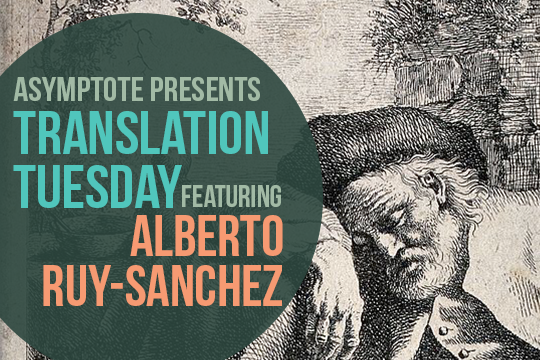
The unorthodox torment of Don Marcelino Menéndez y Pelayo
The feelings of guilt and uncertainty that dominate this stand-alone addendum to Alberto Ruy-Sanchez’s 1987 novel, Los demonios de la lengua, wrestle with the tension between religion and eroticism that was central to the author’s Jesuit upbringing. The story’s prose-poetry style prioritises diction and imagery over narrative, making for a complex and rewarding read.
Among Apples
Not words but serpents emerged from his mouth. And some of these vipers had the heads of goats, of iguanas, salamanders, toads; they were eagles without wings, fish without rivers, tongues without saliva. One tongue divided in two, in three, in ten, in six times one hundred and eleven nightmares. And the odor that emanated from these tongues, reminiscent of the rotten fish that serve as a delicacy in Sweden and an omen of tragedy in Denmark, was so dense as to be visible—and it looked back at us. It was a cloud with eyes, horns, jaws, a bristly beard and pointed ears. It looked like Satan on the verge of unleashing his fury, but it was only the scent of Don Marcelino’s breath as he dozed at midday.